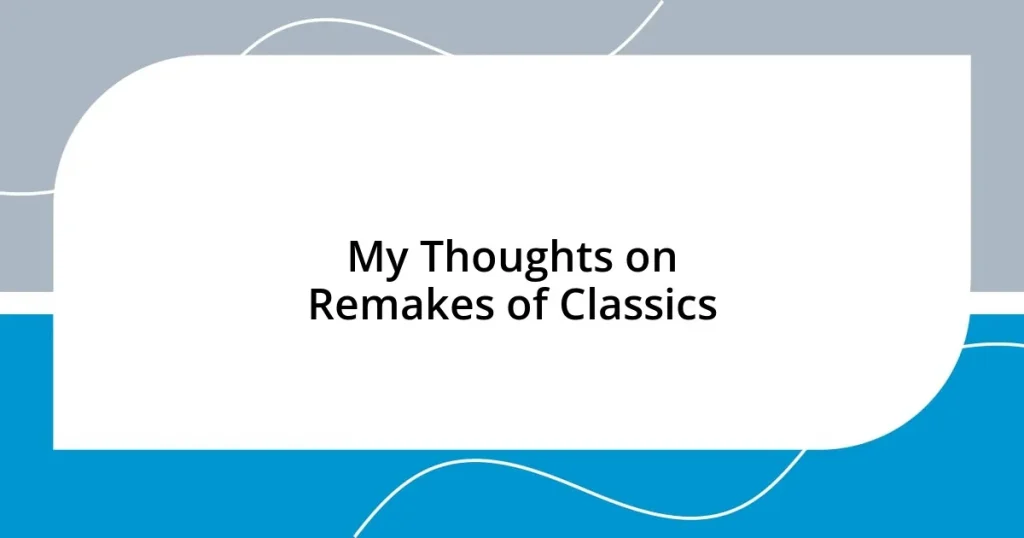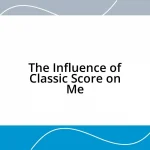Key takeaways:
- The surge in movie remakes is driven by nostalgia, financial safety, and the desire to introduce classic stories to new audiences.
- Successful remakes can effectively modernize themes while honoring the essence of the originals, as seen in films like *It* (2017) and *A Star is Born*.
- Audience reception is complex, often rooted in emotional connections to originals, making it a balancing act between innovation and nostalgia.
- Critics highlight the potential for remakes to address contemporary issues but also caution against losing what made the originals special.
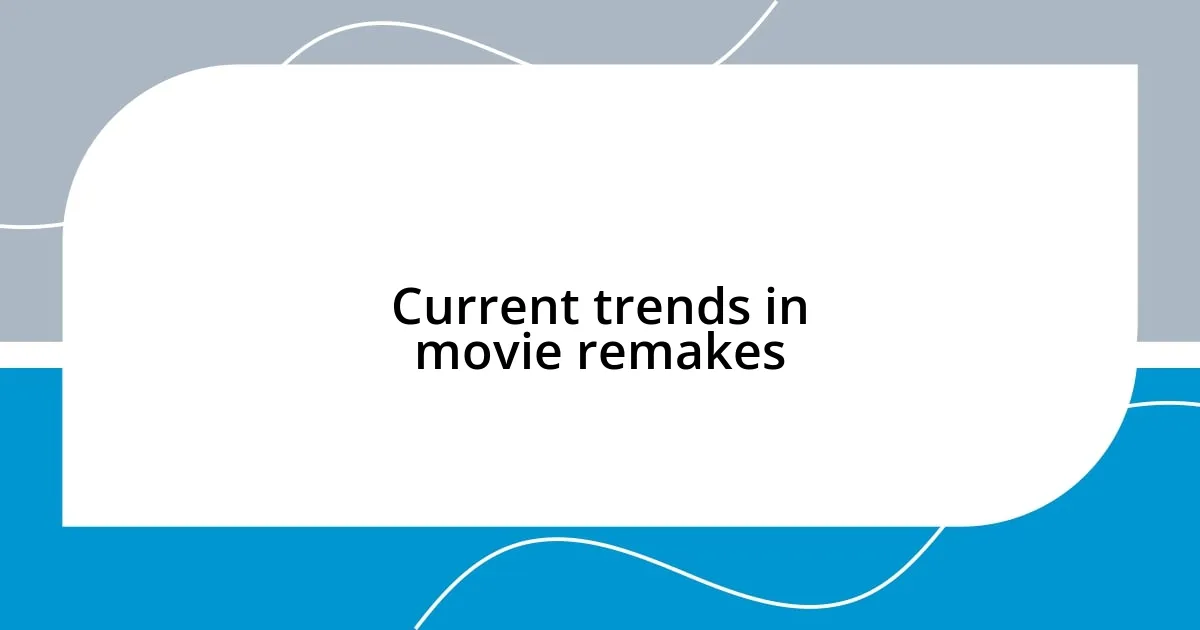
Current trends in movie remakes
In recent years, we’ve seen an explosion of remakes hitting the big screen, often driven by nostalgia. It’s fascinating to think about how these films can rekindle the joy of our childhoods or introduce classic stories to new generations. I remember when I saw the remake of The Lion King—while it had stunning visuals, I couldn’t help but feel a twinge of sadness for the raw emotion of the original’s animation that I cherished.
Moreover, the trend appears to be shifting toward reimagining not just beloved films but also cult classics. This approach seems to tap into a different kind of audience, almost daring to challenge the original narratives. Have you ever watched a remake and thought, “What were they thinking?” Sometimes I feel that remakes can miss the mark, trying too hard to innovate instead of honoring the essence of what made the original resonate with so many.
Interestingly, streaming platforms have become significant players in this trend, greenlighting remakes at an astonishing rate. I find it intriguing how these platforms are willing to invest heavily in familiar stories, banking on their established popularity to attract viewership. It raises the question: Are we craving comfort in familiarity, or are studios simply playing it safe in a risk-averse market?
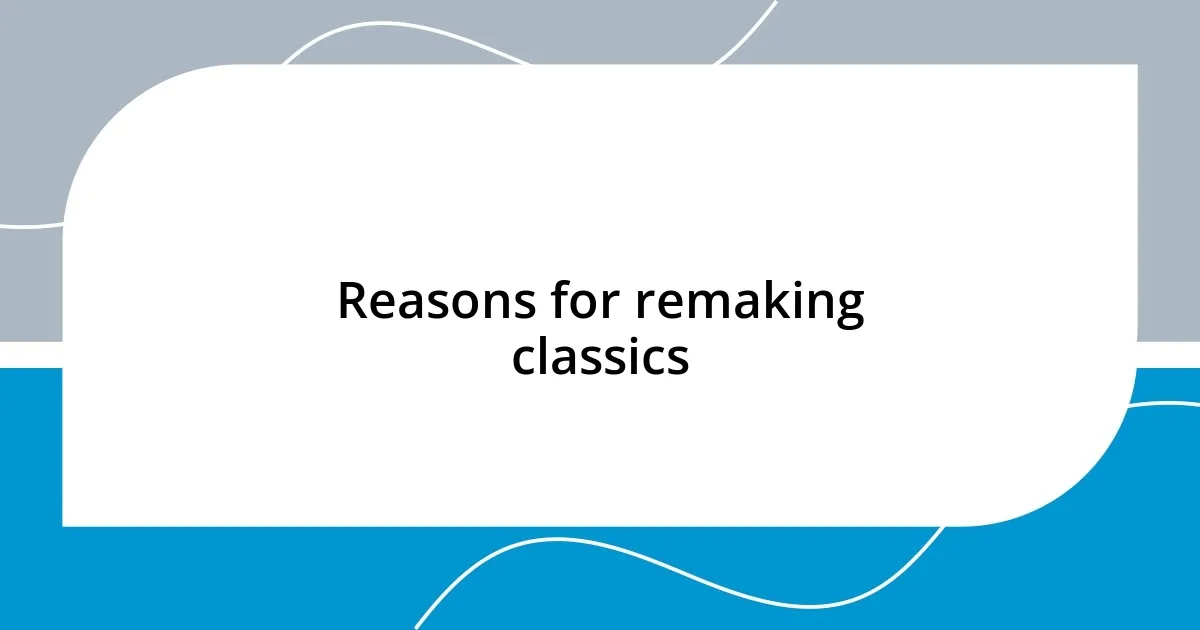
Reasons for remaking classics
Remaking classics can breathe new life into stories that have shaped our culture. I often find that these modern adaptations offer a chance to explore themes relevant to today’s society, which can make the original narratives feel relatable for a new audience. For instance, I watched a remake of A Star is Born, and it struck me how the contemporary issues of mental health and fame felt so much more pronounced than in earlier versions.
- Remakes can introduce classic films to younger generations who may not otherwise experience them.
- They provide an opportunity for filmmakers to modernize outdated portrayals, addressing social issues that resonate today.
- Nostalgia plays a powerful role, making audiences eager to revisit beloved stories through a fresh lens.
Additionally, financial considerations can’t be overlooked. I remember chatting with a filmmaker at a conference who explained how remaking a classic often comes with built-in marketing advantages. It’s like having a head start; audiences are more likely to flock to a familiar title rather than risk trying something entirely new. The comfort of knowing a story can lead to a more substantial box office turnout, making it an appealing route for studios.

Successful remake examples to study
Remakes can be fascinating benchmarking tools for what works in storytelling and filmmaking. For example, the 2017 version of It not only captured the haunting essence of Stephen King’s original story but also deftly modernized the themes of fear and friendship. I remember the thrill I got watching the new film; it felt like I was diving back into childhood nightmares while also experiencing the camaraderie of the contemporary kids. The strong performances and updated cinematography also played a significant role in its success, making it resonate with audiences old and new alike.
Another successful remake that stands out is The Great Gatsby from 2013. The lush visuals, contemporary soundtrack, and Leo DiCaprio’s magnetic performance gave this classic tale a modern flair that compelled me. It reminded me of the importance of balancing classic storytelling with innovative approaches. Sometimes, it’s about breathing new life into the foundation while respecting the core themes that originally captivated audiences. These successes show that when done right, remakes can stand proudly beside their originals.
Lastly, I’m always impressed by how the Ocean’s Eleven remake transformed a quirky 1960s film into a slick, ensemble caper that defined heist films for the 21st century. I think it’s an exemplary case of how blending classic charm with contemporary filmmaking can yield spectacular results. The chemistry among the cast felt electric, creating a fresh narrative while honoring the playful mischief of the original. It’s these types of successful remakes that provide compelling models to study.
| Original Film | Successful Remake |
|---|---|
| It | It (2017) |
| The Great Gatsby | The Great Gatsby (2013) |
| Ocean’s Eleven | Ocean’s Eleven (2001) |
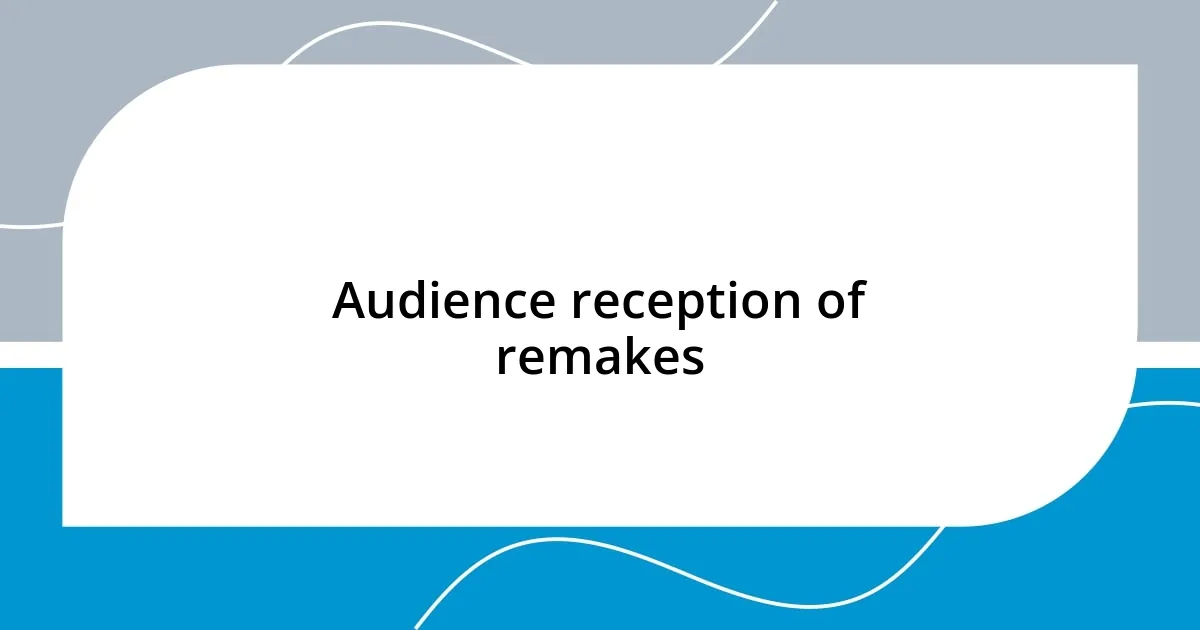
Audience reception of remakes
Audience reception of remakes can often be a mixed bag, creating a fascinating dialogue among viewers. I remember sitting in a theater during the premiere of a beloved classic’s remake, eager yet anxious. As I watched my fellow audience members react, their initial excitement began to wane, revealing a collective apprehension about whether this new version could live up to the original. It struck me how nostalgia can be both a comforting blanket and a heavy weight, influencing how we perceive these new adaptations.
The emotional connection to the original film plays a significant role in how remakes are received. I’ve noticed that when a remake tries too hard to emulate the charm of its predecessor, it often gets criticized for being unoriginal. For example, after watching a remake that fell flat, I found myself pondering what exactly was missing. Was it the absence of the authentic emotion present in the original, or simply my own bias as someone who had cherished the first iteration? Such reflections reveal a deeper truth about audience expectations: we crave familiarity, yet also desire innovation.
Market performance often mirrors audience sentiment. A film’s financial success can create a misleading narrative that all remakes are universally adored. During a conversation with a friend who is a film enthusiast, we dissected the box office numbers of several remakes. It was interesting to discover that high ticket sales didn’t always correlate with positive reviews. This made me wonder: are audiences rushing to see remakes out of genuine hope for a great experience, or is it sheer curiosity driven by nostalgia? Ultimately, it’s a reminder that while remakes can spark joy, they also spark a complex web of emotions and reflections that can define their reception.
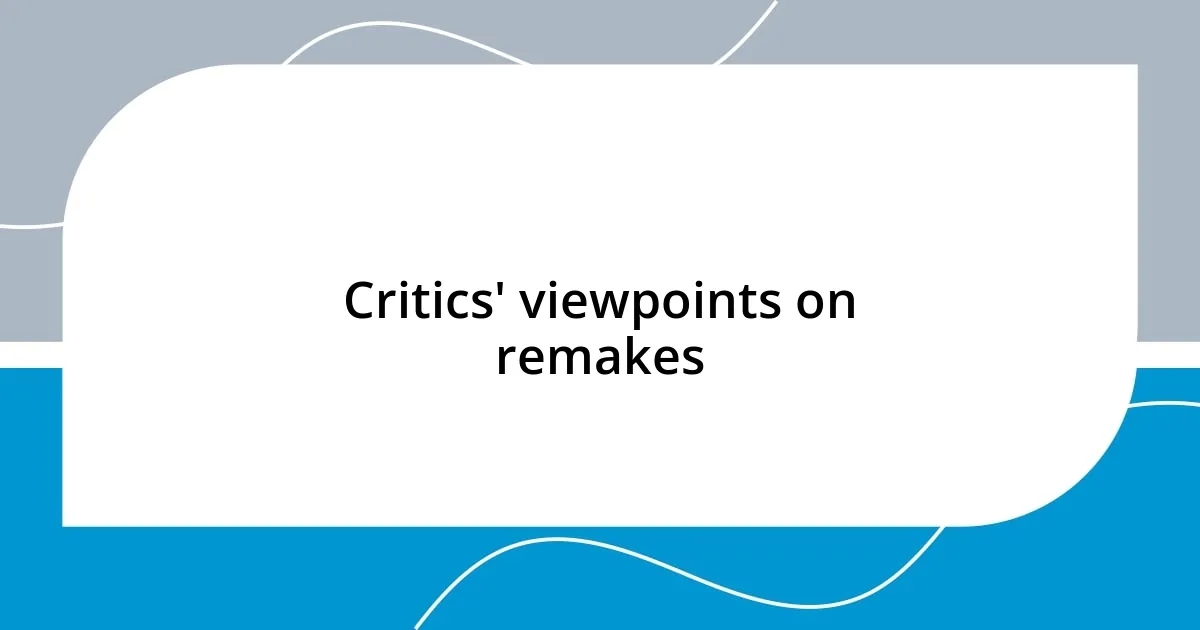
Critics’ viewpoints on remakes
When delving into critics’ viewpoints on remakes, you find a diverse spectrum of opinions. Some critics argue that remakes can breathe fresh air into old stories, enabling new audiences to connect with characters and narratives that might otherwise feel distant. I recall reading a review where the critic celebrated a remake for its ability to highlight contemporary issues through a classic lens, suggesting that sometimes these retellings truly add value rather than detract from the original. But is the reinterpretation enough to justify the existence of a remake?
On the flip side, several critics lament the overreliance on nostalgia, suggesting that remakes often miss the essence of what made the original special. I remember a particularly heated debate I had with a friend who claimed that some films should be left untouched, arguing that the unique magic of the originals could be overshadowed by flashy updates. This sentiment resonates with many who feel that remakes can come off as cash grabs instead of genuine artistic efforts. What do you think—should every classic be revisited, or are there sacred cows that deserve to remain undisturbed?
Furthermore, critics frequently discuss the cultural implications of remaking a classic. They often raise valid points about how the context of a story changes over time, which can lead to a fresh exploration or a misguided representation. A thought-provoking article I read recently highlighted how remakes could serve as a reflection of societal shifts. This made me think: if a beloved classic is remade, can it truly honor its origins while addressing current realities? It’s a complex balance that critics navigate, and their insights can illuminate the deeper layers of what we watch and why we feel strongly about it.
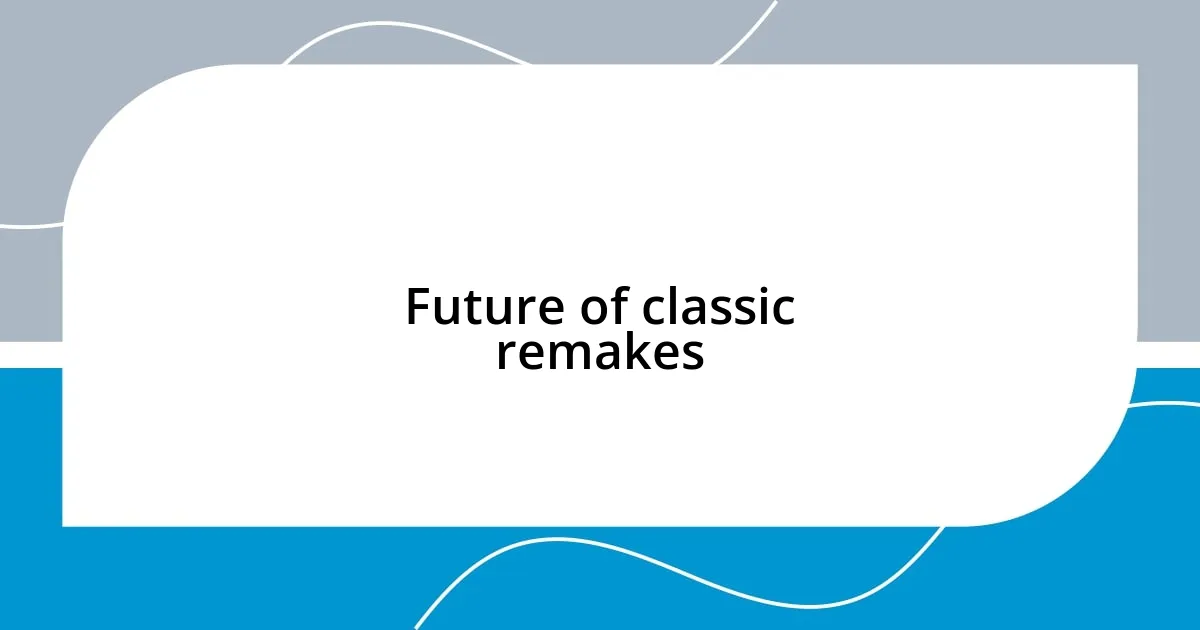
Future of classic remakes
Anticipating the future of classic remakes fills me with both excitement and trepidation. I think back to how certain remakes, like the modern adaptation of “A Star is Born,” not only honored its predecessors but also infused fresh emotion, making it resonate with a new audience. This blend of nostalgia and innovation is crucial, as it identifies the sweet spot where both old fans and newcomers can find common ground.
As filmmakers continue to broaden their horizons, I wonder if we’ll see even more diverse voices stepping into the directorial booth. For instance, imagine a classic story being told through the lens of a filmmaker from a completely different culture. This shift could enrich narratives and provide perspectives unheard in previous versions. I strongly believe modernization in storytelling can introduce vital themes relevant to today’s world while showcasing the enduring nature of these classic tales.
Looking ahead, I can’t help but question whether the trend of remaking classics will lead to true originality or merely a cycle of reboots. Personally, I find it refreshing when a remake takes risks rather than playing it safe by sticking to established formulas. Yet, is there a point when the formula can actually become a creative hindrance? As we navigate this evolving landscape, it’s essential for filmmakers to balance honoring the essence of the original with a visionary approach that captivates today’s discerning audiences.











